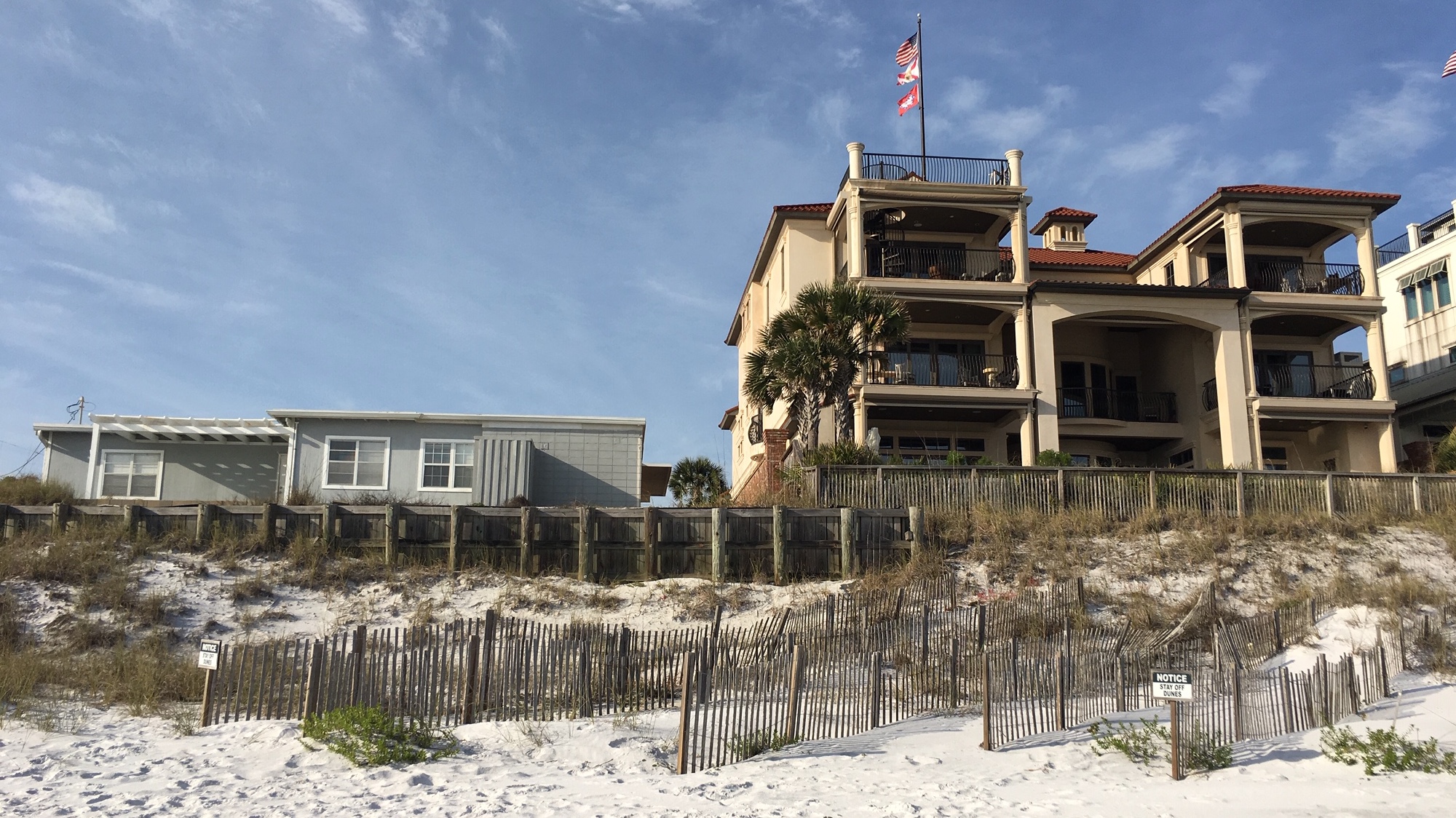
Mother Jones illustration; John Taggart/dpa/AP; Getty
Not long after his failed 2008 presidential bid, former Arkansas Gov. Mike Huckabee bought a beachfront plot in the Florida Panhandle and built a three-story, 10,000-square-foot mansion, with six bedrooms, seven-and-a-half bathrooms, and a pool. By planting his flag in the Florida sugar sand, Huckabee was escaping Arkansas income taxes and joining other rich Republicans who owned houses in this particular part of Walton County, including Karl Rove. The beach house was a sign that he’d made it. As he explained in an email to a state senator years later, “Having grown up dirt poor in Arkansas, I never thought I’d see saltwater in person, much less live on a beach.”
There was just one problem: Huckabee built his dream house on a public beach, a spot where some of the more than 4 million spring breakers and tourists who come to Walton County each year had been parking their lawn chairs and fishing poles since time immemorial. That meant the Fox News contributor had to share much of the 115-foot-long spit of sand in front of his $6 million house with those who helped pay for it—the people who watch his TV show. And he didn’t like it one bit.
So Huckabee, father of White House press secretary Sarah Huckabee Sanders, lobbied local officials to cleanse it of the riffraff. Now, along with his rich neighbors, he’s taken the matter to court. In doing so, he and the other wealthy beachfront property owners have set off an epic legal battle, one that has Florida cops booting unsuspecting tourists off the beaches just as summer vacation season sets in.

Mike Huckabee’s beach house (right) and some of the sand he claims belongs only to him.
Stephanie Mencimer / Mother Jones
The issue has become so toxic that the state’s Republican governor skipped out on some public appearances to avoid protesters last year. Beach access activists say the legal fight has larger implications, not just for Florida but across the country, as wealthy, powerful people try to annex public beachfronts for their private benefit. “This is just the beginning,” says Santa Rosa Beach attorney Daniel Uhlfelder, one of the activists leading the fight against beach privatization. “If they’re able to pull this off, they’re going to take this to other coastlines around the country.”
In 2012, Huckabee hired a lawyer and asked a judge to grant him ownership of the land stretching from the dune at the foot of his house down to the mean high-water line—essentially the wet sand and the Gulf of Mexico itself. No one appears to have protested the request, and the judge agreed, giving Huckabee the beach for a mere $400. Nearly two dozen of his neighbors have also quietly annexed the beach while escaping any additional taxes.
The result is a checkerboard of public and private space along the water’s edge for miles of Walton beachfront. Huckabee’s beach is private, but the one next door isn’t—at least not for now. Last summer, Huckabee bought the three-bedroom 1960s bungalow next door for $3 million, through a trust. This March, he filed a lawsuit to extend the house’s property line from the base of the house to the mean high-water line, thus expanding his empire and annexing a beach that’s been used by the public for generations. If he succeeds, he won’t have to pay any additional taxes on the land, either.
In 2016, the rash of homeowners attempting to privatize their beaches prompted Walton County to pass an ordinance declaring all 26 miles of beach in the county open for public use, although many remained privately owned. The county was on solid ground here: The Florida Supreme Court had declared the public’s right to enjoy the dry sand of private beaches back in 1974.
“No part of Florida is more exclusively hers, nor more properly utilized by her people than her beaches,” the court wrote with poetic flair, adding, “There is probably no custom more universal, more natural or more ancient, on the sea-coasts, not only of the United States, but of the world, than that of bathing in the salt waters of the ocean and the enjoyment of the wholesome recreation incident thereto.”
For all Huckabee’s distaste for the public, Walton County wouldn’t have much in the way of beaches if not for the massive contribution of taxpayers. Climate change–induced sea-level rise is eroding the sand, and the stretch of beach in front of Huckabee’s house had been hit by seven hurricanes in the six years before he bought the plot. The county has spent millions of dollars trucking in sand to renourish its beaches and preserve its primary industry: tourism. But that hasn’t deterred rich property owners from suing the county, claiming that it illegally seized their property when it passed the public use ordinance.
They had help from the Pacific Legal Foundation, a libertarian public interest law firm funded over the years by Exxon Mobil, the tobacco industry, the Koch brothers, and a host of right-wing foundations. (PLF had joined a similar fight in California, when a tech billionaire fought all the way to the Supreme Court to restrict public access to the beach in front of his house, ultimately losing.) In late 2017, a federal court ruled in Walton County’s favor.
So Huckabee turned to politics, lobbying the state legislature, whose members were more pliable than federal judges. Huckabee and Blue Diamond Horizons, a company registered to Huckabee that has no website or public presence, each donated $1,000 to a commission candidate who had privately offered to oppose public use of the beach. After the candidate won, he came out in support of public beach access.
With the help of a high-powered lobbyist, beachfront property owners persuaded Rep. Katie Edwards-Walpole, a Democrat from South Florida, to cosponsor HR 631, a law gutting the ability of local governments to pass ordinances granting public access to privately owned beaches. Two other counties that already had these ordinances were grandfathered in the law, leaving Walton County as the only place where the bill would invalidate an existing ordinance. When the law went into effect on July 1, 2018, Walton County homeowners quickly put up “no trespassing” signs on their beaches, hiring armed security and installing ropes to cordon off their little pieces of paradise.
Huckabee wrote a thank-you note to the Republican co-sponsor of the bill, complaining that he and his neighbors were “demonized as ‘greedy, selfish and rich’ owners who want to deprive the poor of their ‘rights.’” He added, “I’ve found used condoms on my walk-down, glass bottles broken, dog feces, litter. Sharp tent poles that can cut bare feet and worse. Large tents with large groups with boom boxes make using my own property very difficult during high season.” (Huckabee did not respond to requests to comment for this story.)
The bill didn’t just ruin the vacations of tourists who rented houses near the beach only to encounter security guards who chased them off. It also prevented Huckabee’s neighbors who own the modest cottages behind his mansion from using the beach just steps from their front doors. “All those thousands of people who’ve invested in homes that are close to the beach, are they going to be allowed to go to the beach as they have for years?” says Dave Rauschkolb, who owns a restaurant in Seaside, a wealthy Walton County beach town a few miles from Huckabee’s house, and has been fighting the beach privatization. “Probably not.”
The involvement of a South Florida Democrat in wiping out public beach access in the Panhandle, an area that Donald Trump won by 40 points in the 2016 presidential election, surprised locals. But emails obtained by activists showed that Edwards-Walpole had met with lawyers from the Pacific Legal Foundation in 2017 about public use of the beach—an issue that wasn’t relevant to her district. Edwards-Walpole also conceded that she had consulted on the bill with the area’s Congress member, Rep. Matt Gaetz (R-Fla.), with whom she’d worked on medical marijuana bills when he was in the state legislature. (Edwards-Walpole did not respond to a request for comment.)
Gaetz’s family owns several homes in Walton County, including one in Seaside that was used in the filming of The Truman Show as the home of Jim Carrey’s title character. Many of the property owners seeking to privatize their beaches, including Huckabee, are big donors to Gaetz’s campaigns, and Gaetz’s family is close friends with Huckabee. A week after Edwards-Walpole’s bill took effect, Huckabee hosted a fundraiser for Gaetz’s reelection campaign at his beach house.

The Seaside house owned by the parents of Rep. Matt Gaetz (R-Fla.) that was used in Jim Carrey’s The Truman Show
Stephanie Mencimer / Mother Jones
Gaetz has denied any role in the passage of HR 631. “The rumors of my omnipresent influence are vastly overstated,” he told Mother Jones. “While I’m here in Congress working with the president and leading on a number of these critical oversight issues, do you think I was really back in Florida politicking with a South Florida Democrat over these beach issues? It strains credulity.”
There’s good reason that Gaetz might want to distance himself from the law, which is so unpopular that 11 days after the bill took effect, Republican Gov. Rick Scott issued an executive order trying to block its enforcement. There are only 900 or so beachfront property owners, many of whom are not full-time county residents, and more than 14,000 Walton County residents have signed affidavits supporting public beach use. A poll in September 2018 showed that Florida residents of both parties, particularly those in the Panhandle, overwhelmingly opposed allowing homeowners to ban the public from using the dry sand adjacent to their homes.
I asked Gaetz where he stands on the issue roiling his district. “I support a compromise where people can use the beach, where property owners don’t have to have someone setting up a campsite in their yard,” he said. “I think that needle can be threaded. I’m glad that I’m a congressman and not a Florida legislator and that there will be others who will deploy their talents to that question.”
Ultimately, the courts will decide whether Huckabee gets to have his private beach. Huckabee is one of several hundred property owners involved in a lawsuit with the county, which is trying to use the new requirements set out in HB 631 to reestablish public use of the beach. If they win, “this precedent will be set, and coastal American communities are suddenly going to be inundated with security guards, signs and very unhappy people,” says Rauschkolb, the Seaside beach activist.
Meanwhile, Huckabee may get his comeuppance for trying to seize a piece of nature for himself. His monstrosity of a mansion was never supposed to be built in the first place. Blue Mountain Beach, where his house is located, was slammed by consecutive hurricanes in 2004 and 2005, which left the beach critically eroded. The lot he purchased was supposed to be unbuildable. It sits atop a state line designating where a major storm surge is likely to reach, beyond which development is prohibited without a special permit. Undeterred, according to a Reuters investigation, Huckabee hired a contractor who dumped sand on the beach to create a fake dune and lobbied environmental officials to say that with the imported sand pile, his building site was adequately protected from storms and met the criteria for a waiver from the law.
If Huckabee’s house doesn’t get flattened by a hurricane first, sea-level prediction maps suggest that it is likely to get flooded regularly over the next 20 years by worsening storm surges. When those disasters inevitably happen, Huckabee will no doubt be asking the very taxpayers he doesn’t want on his beach to help pick up the tab to restore it.
This story has been updated to clarify Walton County’s renourishment of its beaches and to include Huckabee’s purchase of the property next to his house.












